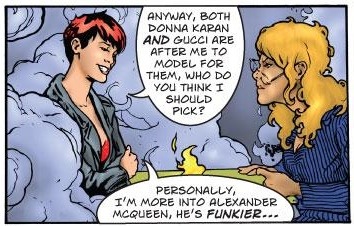The Laugh Out Loud Cats is a much-admired webcomic around here, and we’re glad to hear that Abrams ComicArts just brought out a print edition. Over at Neatorama, creator Adam Koford discusses the origins of the comic and some of his creative influences, including Paper Moon, Dennis the Menace, and one of my all-time favorite movies, Sullivan’s Travels. (Via Robot 6.)
Over at Good Comics for Kids, Kate Dacey reviews the first print edition of The Araknid Kid, by Josh Alves, which started out on Zuda and moved over to Sugary Serials before hitting the dead tree format.
Bengo has an interesting post at The Floating Lightbulb, in which he looks at Google’s graphs of traffic for various webcomics and sees a marked decline in readership over the past few years. Readers question the accuracy of the data in comments, and I don’t know enough about Google data to be able to analyze it myself, but the trend looks marked and consistent, and some interesting discussions crop up in the comments section. UPDATE: Over at The Comichron, John Jackson Miller is hearing from webcomics creators that Google Trends seems to be understating their traffic.
One sign that a trend has jumped the shark is when the politicians start getting into the act, so make what you will of the fact that the Washington state legislature just passed a resolution honoring Gabe and Tycho of Penny Arcade. (Via Journalista.)
Jennifer Contino talks to Johnny Zito and Tony Trov, the creators of the Zuda-winning Black Cherry Bombshells, at The Pulse.
Shaenon Garrity interviews Ed Quinby, the creator of Teregrin, at Talk About Comics.
Larry Cruz checks in with reviews of Sister Claire and The Princess Planet at The Webcomic Overlook.
Delos reviews Dovecote Crest at Art Patient.
At Occasional Superheroine, Valerie D’Orazio reviews three webcomics that “address sensitive women’s issues with a great frankness and courage, and demonstrate what can be done using this medium for the cause of education & social justice.” They are: Unmasked: The Ariella Dadon Story, The Shake Girl, and Hathor the Cow Goddess.

